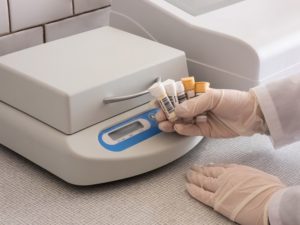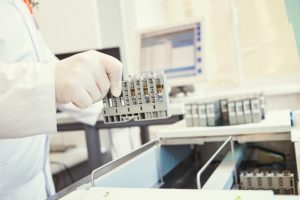The medical care we receive has improved greatly over the years, thanks to technological advancements that allow for earlier and accurate diagnoses that lead to more effective treatments. One such example is the advancement of immunoassay analyzers, which are medical instruments used to diagnose diseases and other abnormalities within our system, as well as help confirm our health status. With the help of recent computer technology, biochemical testing has taken a new leap in turnaround time and accuracy. It has opened up new treatment possibilities and provided clearer pictures of patients’ health issues.
A Deeper Look into Immunoassays
Immunoassays are biochemical tests that involve detecting the presence of specific substances and determining the amount of those substances in various sample types such as blood, urine, plasma and more. These can be detected through the use of antibodies and antigens as reagents. Antigens – such as bacteria, proteins, antibiotics, peptides, lipids and so on – are substances that can stimulate the immune system to produce antibodies. In turn, our immune system uses these antibodies to fight the antigens and eliminate them.
Specific antigens will only produce specific antibodies, which makes it easy to identify the presence of a particular substance. For example, clinics can detect whether a patient has HIV by conducting an immunoassay to look for antibodies that are produced as a result of this disease. Prostate cancer also can be detected with the Prostate Specific Antigen (PSA) test. Many more diseases can be detected with the use of the immunoassay analyzers.
How Advanced Immunoassay Analyzers Improve the Process and Patient Care
 Faster and more accurate results are highly achievable via the use of current technology. Immunoassay analyzers have become highly automated over the years. In an effort to reduce human errors and enhance speed, machines with advanced capabilities and high throughput rate are now dominating the industry. Laboratories with investments on these instruments are able to improve their productivity level with confidence. Leading medical instrument manufacturers for the device are offering higher flexibility and comprehensive features with their analyzers that include scalability, simplicity of operations, streamlined maintenance and inventory management. They also offer the benefits of enhanced procedure consistency that can help reduce training and labor costs. These value propositions are clearly meant to benefit laboratories and healthcare institutions using the device. It also helps support better patient care and improve treatment plans.
Faster and more accurate results are highly achievable via the use of current technology. Immunoassay analyzers have become highly automated over the years. In an effort to reduce human errors and enhance speed, machines with advanced capabilities and high throughput rate are now dominating the industry. Laboratories with investments on these instruments are able to improve their productivity level with confidence. Leading medical instrument manufacturers for the device are offering higher flexibility and comprehensive features with their analyzers that include scalability, simplicity of operations, streamlined maintenance and inventory management. They also offer the benefits of enhanced procedure consistency that can help reduce training and labor costs. These value propositions are clearly meant to benefit laboratories and healthcare institutions using the device. It also helps support better patient care and improve treatment plans.
Immunoassay analyzers are often broken down into models with different processing capabilities, oftentimes based on the demand of the unit or volume. Most medical instrument companies offer different reagents and assays that works in conjunction with the analyzers, many are designed for specific type of tests. For example, prostate health can be more accurately observed with a test that uses an assay made specifically for a prostate health check. Specific thresholds for different age groups and a thorough report that requires peer review for the higher confidence level of the results can be offered as a part of the procedure. A specialized prostate assay kit may require specific blood tests processed through the analyzers that could yield a score or reading that provides more information on the results and the patient’s potential issues.
Technologies That Drive the Success of Advanced Immunoassay Analyzers
 With different levels of demand and the various types of healthcare facility’s needs, the analyzers are often being evaluated by their processing capabilities, reliability and ease of use. The differences in needs for a facility with an annual test volume of below, for example, 10,000 vs. higher than 80,000 and the required throughput per hour rate would dictate the type of immunoassay analyzers needed. These machines are mission-critical in nature and each requires the use of an industrial computer that is capable of operating 24/7 with high dependability and also with matching processing power to perform complex tasks. Embedded motherboards or systems are integrated into these devices to control their operations. Touch panel PCs or display monitors made specifically for healthcare environments can also be integrated for use as a user interface for the analyzers. These motherboards, embedded systems and touch panel computers should offer rich I/Os that are designed for expansion and ease of customization. The considerations can also include future-proofed computer solutions with high interoperability with software and other peripherals. These key features are highly desirable for medical device OEMs/ODMs.
With different levels of demand and the various types of healthcare facility’s needs, the analyzers are often being evaluated by their processing capabilities, reliability and ease of use. The differences in needs for a facility with an annual test volume of below, for example, 10,000 vs. higher than 80,000 and the required throughput per hour rate would dictate the type of immunoassay analyzers needed. These machines are mission-critical in nature and each requires the use of an industrial computer that is capable of operating 24/7 with high dependability and also with matching processing power to perform complex tasks. Embedded motherboards or systems are integrated into these devices to control their operations. Touch panel PCs or display monitors made specifically for healthcare environments can also be integrated for use as a user interface for the analyzers. These motherboards, embedded systems and touch panel computers should offer rich I/Os that are designed for expansion and ease of customization. The considerations can also include future-proofed computer solutions with high interoperability with software and other peripherals. These key features are highly desirable for medical device OEMs/ODMs.
These analyzers can also offer a variety of value-added features. For example, some analyzers come with refrigerated storage for the reagents and test subjects for added convenience and time-saving which, in turn, result in higher productivity level. Some offer specific features and reporting to work with specialized assays. All features require interoperability among the analyzer’s hardware, software and other peripherals and are crucial for the device to deliver its complete capabilities. Designing such instruments is a complex and lengthy process. The Federal Food and Drug Administration’s approval plays a key role in determining the success or failure of these medical devices and the certification process can be costly and lengthy. Choosing the right hardware for the device is among the most important success factors for medical device manufacturers.
Axiomtek Medical Computer Solutions and Services
Axiomtek offers a wide range of high quality fanless embedded systems, embedded motherboards and medical-grade to light or heavy-duty touch panel computers, which have been selected by world-renowned medical device manufacturers, OEMs and ODMs for many complex medical applications.
Axiomtek’s comprehensive product lines of fanless embedded systems feature high performance, scalable computing power and high flexibility to serve as the brains of the immunoassay analyzers’ operation. They are designed with ease of customization in mind. Our embedded motherboards also offer easy-to-integrate design with rich features and come in a variety of form factors.
Our UL 60601-1/EN 60601-1-certified medical touch panel computers are manufactured in ISO 13485 facilities with spill-proof antimicrobial enclosures. They come in a variety of sizes and types of touch screens, and have the ability to connect with peripherals like RFID scanners. They have been used as a user interface to manage the unit’s operation and communicate procedure requirements and other key data. They are also used as a reporting tool and more.
Similarly, if medical device OEMs or ODMs prefers a regular touch panel PC or display monitor to be integrated as the user interface of the device, Axiomtek offers comprehensive product lines of both. They are built to last and offer many useful features including a variety of brightness and various types of touch screens with backlight features. Learn more here.
We also offer design engineering and value-added services to support medical device manufacturers, OEMs and ODMs throughout all stages of their device development process. With more than 25 years of expertise in providing board- and system-level design assistance, Axiomtek has continued our commitment to deliver high quality, purpose-built computer solutions and first-in-class services to help our customers successfully and effectively achieve their project goals.


